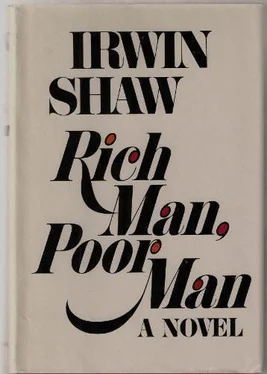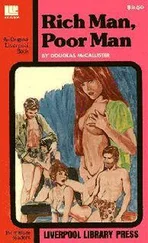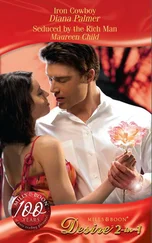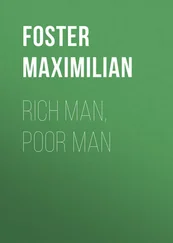“Thank you, sir,’ he said as he backed off.
The head waiter appeared with a bottle of red wine from France and a table waiter came up with their first course. There was no manpower shortage at The Old Farmer’s Inn.
The head waiter ceremoniously poured a little-of the wine into a huge, deep glass. Boylan sniffed it, tasted it, looked up, squinting, at the ceiling, as he kept it for a moment in his mouth before swallowing. He nodded at the head waiter. ‘Very good Lawrence,’ he said.
Thank you, sir,’ the head waiter said. With all those thank yous, Gretchen thought, the bill was going to be horrendous.
The head waiter poured the wine into her glass, then into Boylan’s. Boylan raised his glass to her and they both sipped the wine. It had a strange dusty taste and was warm. Eventually, she was sure, she was going to learn to like that taste.
‘I hope you like hearts of palm,’ Boylan said. ‘I developed the taste in Jamaica. That was before the war, of course.’
‘It’s delicious.’ It tasted like a flat nothing to her, but she liked the idea that a whole noble palm tree had been cut down
just to serve her one small, delicate dish.
“When the war is over,’ he said, picking at his plate, ‘I’m going to go down there and settle. Jamaica. Just lie on the white sand in the sun from year’s end to year’s end. When the boys come marching home this country’s going to be impossible. A world fit for heroes to live in,’ he said mockingly, ‘is hardly fit for Theodore Boylan to live in. You must come and visit me.’
‘Sure,’ she said. ‘I’ll rhumba on down on my salary from the Boylan Brick and Tile Works.’
He laughed. ‘It is the proud boast of my family,’ he said, ‘that we have underpaid our help since 1887.’
‘Family?’ she said. As far as she knew, he was the only Boylan extant. It was common knowledge that he lived alone in the mansion behind the stone wails of the great estate outside town. With servants, of course.
‘Imperial,’ he said. ‘We are spread in our glory from coast to coast, from pine-clad Maine to orange-scented California. Aside from the Boylan Cement plant and the Boylan Brick and Tile Works in Port Philip, there are Boylan shipyards, Boylan oil companies, Boylan heavy-duty machinery plants throughout the length and breadth of this great land, each with a Boylan brother or uncle or cousin at its head, supplying the sinews of war at cost-plus to our beloved country. There is even a Major General Boylan who strikes shrewd blows in his nation’s cause in the Service of .Supply in Washington. Family? Let there be the sniff of a dollar in the air and there you will find a Boylan, first on the line.’
She was not used to people running down their own families; her loyalties were simple. Her face must have shown her disappointment.
‘You’re shocked,’ Boylan said. Again that crooked look of amusement.
‘Not really,’ she said. She thought of her own family. ‘Only people inside a family know how much love they deserve.’
‘Oh, I’m not all bad,’ Boylan said ‘There’s one virtue which my family has in abundance and I admire it without reservation.’
‘What’s that?’
They’re rich. They’re verrry, verrry rich.’ He laughed.
‘Still,’ she said hoping that he wasn’t as bad as he sounded, that it was just a show-off lunchtime act that he was performing to impress an empty-headed girl, “still, you work. The Boylans’ve done a lot for this town….’
“They certainly have,’ he said. They have bled it white. Naturally, they feel a sentimental interest in it Port Philip is the most insignificant of the imperial possessions, not worth the time of a true, one hundred per cent, up-and-at-em male Boylan, but they do not abandon it. The last and least of the line, your humble servant, is delegated to the lowly home province to lend the magic of the name and the authority of the living family presence at least once or twice a month to the relic. I perform my ritual duties with all due respect and look forward to Jamaica when the guns have fallen silent’
He not only hates the family, she thought, he hates himself.
His quick, pale eyes noted the minute change in her expression. ‘You don’t like me,’ he said.
‘That isn’t true,’ she said. ‘It’s just that you’re different from anyone I know.’
‘Different better or different worse?’
‘I don’t know,’ she said.
He nodded gravely. ‘I abide the question,’ he said. ‘Drink up. Here comes another bottle of wine.’
Somehow, they had gone through the whole bottle of wine and they hadn’t reached he main course yet. The head waiter gave them fresh glasses and there was the ceremony of tasting once more. The wine had flushed her face and throat. The conversation in the rest of the restaurant seemed to have receded and came to her ears now in a regular, reassuring rhythm, like the sound of distant surf. She suddenly felt at home in the polished old room and she laughed aloud.
‘Why are you laughing?’ Boylan asked suspiciously.
‘Because I’m here,’ she said, ‘and I could be so many other places instead.’
‘You must drink more often,’ he said. Wine becomes you.’ He reached over and patted her hand… His hand was dry and firm on her skin. ‘You’re beautiful, pet, beautiful, beautiful.’
‘I think so, too,’ she said.
It was his turn to laugh.
Today,’ she said.
By the time the waiter brought their coffee she was drunk. She had never been drunk before in her life so she didn’t know that she was drunk. All she knew was that all colours were clearer, that the river below her was cobalt, that the sun lowering in the sky over the faraway western bluffs was of a heartbreaking gold. All the tastes in her mouth were like summertime and the man opposite her was not a stranger and
her employer, but her best and most intimate friend, his fine, tanned face kindly and marvellously attentive, the occasional touch of his hand on hers of a welcome calm dryness, his laugh an accolade to her wit. She could tell him anything, her secrets were his.
She had told him anecdotes about the hospital - about the soldier who had been hit over the eye by a bottle of wine that an enthusiastic French woman had thrown to welcome him to Paris and who had been awarded the Purple Heart because he suffered from double vision incurred in the line of duty. And the nurse and the young officer who made love every night in a parked ambulance and who, one night, when the ambulance had been called out had been driven all the way to Poughkeepsie stark naked.
As she spoke, it became clear to her that she was a unique and interesting person who led an incident-crammed, full life. She described the problems she had when she had played Rosalind in As You Like It in the school play in her senior year. Mr Pollack, the director, who had seen a dozen Rosalinds, on Broadway and elsewhere, had said that it would be a crime if she wasted her talent. She had also played Portia the year before and wondered briefly if she wouldn’t make a brilliant lawyer. She thought women ought to go in for things like that these days, not settle for marriage and babies.
She was going to tell Teddy (he was Teddy by dessert) something that she hadn’t confided to a soul, that when the war was over she was going down to New York to be an actress. She recited a speech from As You Like It, her tongue lively and tripping from the Daiquiris, the wine, the two glasses of Benedictine.
‘Come, woo me, woo me,’ she said, ‘for now I am in a holiday humour, and like enough to consent. What would you say to me now, an I were your very, very Rosalind?’
Teddy kissed her hand as she finished and she accepted the tribute graciously, delighted with the flirtatious aptness of the quotation.
Читать дальше











